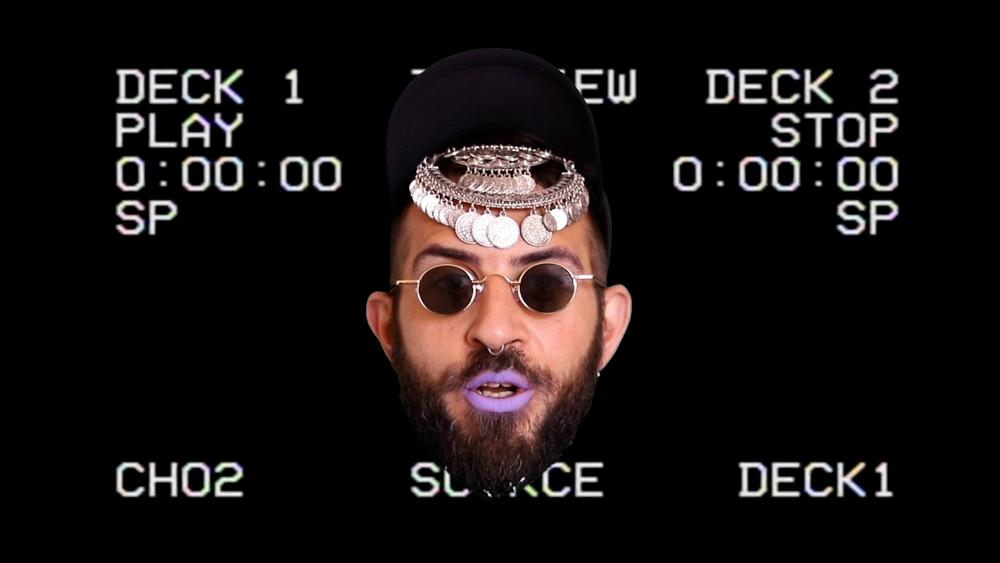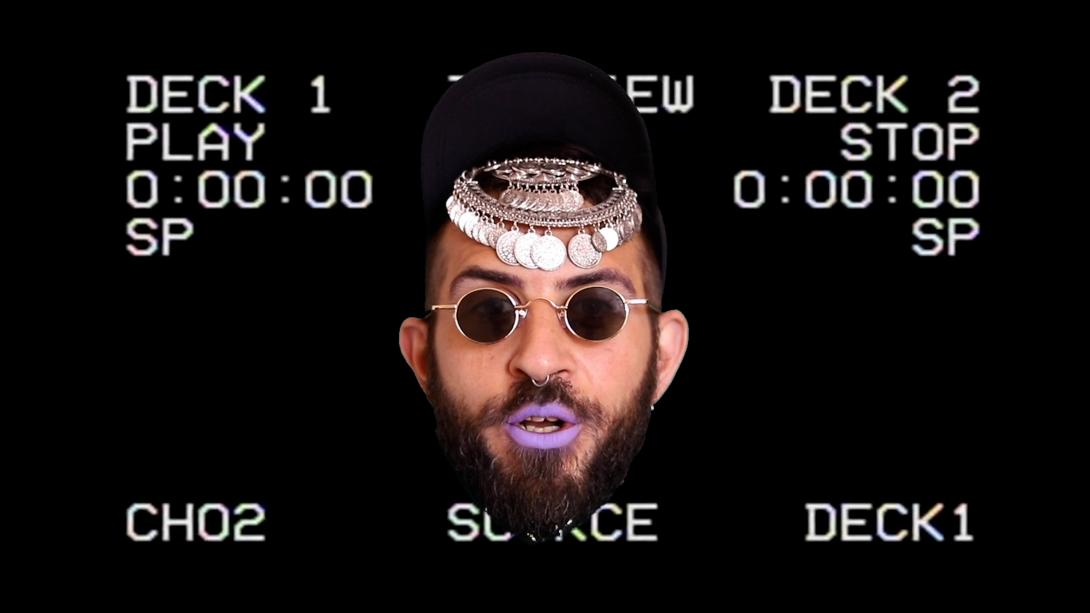X! (une opéra fantastique)
Lees hier het online programmablad, met een interview met Gérald Kurdian.
Lees hier de korte inhoud van de voorstelling en de credits.
I am political through my existence
interview met Gérald Kurdian door Caroline Simonin (Festival d'Automne de Paris). Vertaald vanuit het Frans.
You are a multidisciplinary artist, musician, performer, whose work at the crossroads of disciplines has met with forms as varied as DJing, photography, documentary, stand-up comedy, choir.
Gérald Kurdian: I studied at the Beaux-Arts in the 2000s when we were less attached to a discipline than to a desire to use one medium or another to convey a concept. I come from a DIY (= Do It Yourself) background, I can learn on the job or make things with the means at hand. This already tells of an aesthetic and a political position that goes against the dominant system. For example, in my first piece, 1999, which I created in 2009 at Les Inaccoutumés, I composed a science fiction musical with a camera and DIY instruments.
Music is perhaps the most important discipline in your work. What special place does it occupy?
G.K.: It is a form of diary that allows me to take notes on the daily life that tells the inner states, true or not, of the character of Gérald that I have created. For me, music is also a tool for "disarming the audience", insofar as it allows affects to circulate in the bodies and subjectivities.
On the other hand, it has a useful, social and political role. The history of clubs and electronic music is a history of the margins, with raves, acid house and acid techno. Disco and house music have to do with the history of black and Latin American cultures. Then there was voguing, in the 80s and 90s. The Pulp, a lesbian club with figures who stylistically turned the DJ set on its head, such as Jennifer Cardini, Chloé or DJ Sextoy, offered alternatives in the 2000s to the forms of music produced in the very masculine French studios. It made LGBT and queer emancipation possible. The ‘Kill the DJ’ label opened the door to a whole generation…
You created HOT BODIES OF THE FUTURE precisely to give a place to marginality and allow the body to emancipate itself, to be itself.
G.K.: After working in the French-speaking pop scene where I didn't fit in, I wanted to talk about this discomfort, about what it is to be a minority person who navigates between marginal worlds and dominant scenes. HOT BODIES OF THE FUTURE started as a performative and musical research project on queer micro-politics and alternative forms of sexuality. It has become a production company and an inclusive label. We question the role of music in marginal struggles and how it becomes a place of refuge and repair. It started with three projects: HOT BODIES CHOIRS, choirs that bring together volunteers from queer, decolonial and feminist struggles around a practice of writing and choral singing; the HOT BODIES CLUB evenings, which present various forms of talks, films, performances, and end in a club, conceived on a principle of absolute inclusiveness, accessible to wheelchairs, with sign language translations; and then my solo HOT BODIES STAND UP, which is the continuation of my diary. In the first chapters, I told of my discovery of eco-sexual struggles and circles, of the emanations of ecofeminism led in particular by a couple of American women artists, Annie Sprinkle and Beth Stephens, who are close to the new forms of sexology that are on the side of care and fight against the damage of capitalism in the body. X ! (a fantasy opera), is part of this lineage.
Your artistic work is intimately linked to a militant commitment.
G. K.: I don't know if I do militant work, but I do know that I am interested in using the trust I am given and the means and windows I am offered to make visible the militant forms that can be made visible, although not everything can be exposed on a stage. If certain minoritised bodies are exposed in an institutional context, there is a risk of appropriation and tokenisation or washing out that can be damaging. It may be more prudent to refer to documentary work that has already been made visible. I am political through my existence. When I decide to speak on a stage about abuse, transition, my relationship with my body and dysmorphic or dysphoric visions, it becomes a gesture of visibilisation, a militant gesture. I do sex-positive work. I talk about a practice of reparation that includes decolonial, feminist, post-feminist and xeno-feminist work, the fight against fatphobia, all the bodies that suffer damage unfortunately initiated by the same system.
X! (a fantasy opera), is a poetic and political musical fable. What does the show stir up?
G.K.: X! stirs up the history of opera, of the great stages, of the performers, of the orchestra, of all these choices that are partly the result of bourgeois culture. It is an autofiction that features Gærald - a possibility for me to fluidify, not to say feminise, a non-binary affirmation - but it is also a documentary, a history of the margins. All the video and photo material that is not in 3D is real. I meet people who try to respond to the problems that contemporary bodies encounter with their sexuality and their relationship to pleasure in order to unravel the traumas.
How are the stage and 3D articulated?
G. K.: The people I met were filmed on green backgrounds, and their silhouettes are reincorporated into the 3D universe (an island) in very different ways. The image is multiple. The set, which is mobile, is inspired by the classic painted canvases of the opera. It comes to life through the effect of 3D projection.
What about fiction and documentary?
G. K.: It's really a fable. We arrive on an island that suffers from a mysterious illness. All the characters we meet in the story try to solve it. The real strategies of real activists become answers. To build my story I am inspired by science fiction, the feminist fabulation of Ursula Le Guin or that of Octavia Butler, which remind us of the importance of inventing other, non-normative mythologies, of acting on the imaginary to enable social change.
X! is a solo opera for a performer and an artificial intelligence.
G. K.: The music is really the result of a collaboration between myself and an artificial intelligence. I have entrusted the AI with the role of the orchestral part, and I am in charge of an important work on the possible mutations of the voice, from intimate to spectral. The volatility of the voice in the electronic domain is also a way of talking about identity and the relationship to the self.
In the first part, the HOST, a somewhat troubadour-like character that I play, and an android introduce us to the chapters of the opera. Then we enter the opera. The Artificial Intelligence has been learning classical opera themes (from Purcell to Verdi) for months, in a structural way: overtures, arias, ballets... and it will compose new parts that are played by a mini-orchestra of synthesizers. With the music I would like to touch and concern all bodies, because we are all damaged by a system that puts us under pressure. The video game and the cinema, especially through the figure of the hero, become common references for everyone.

